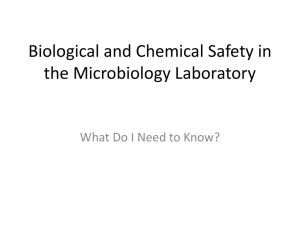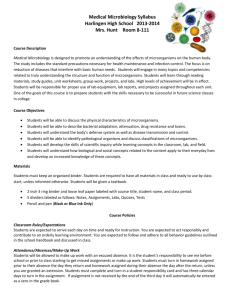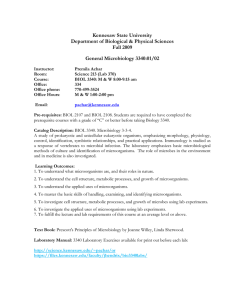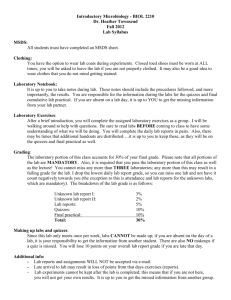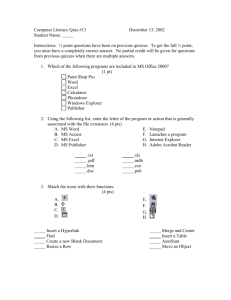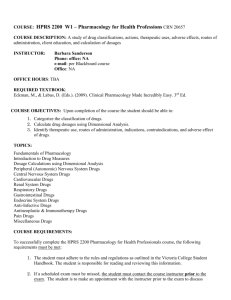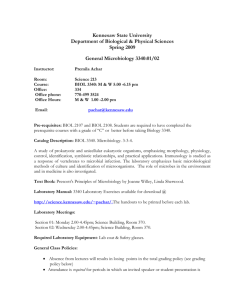Syllabus
advertisement
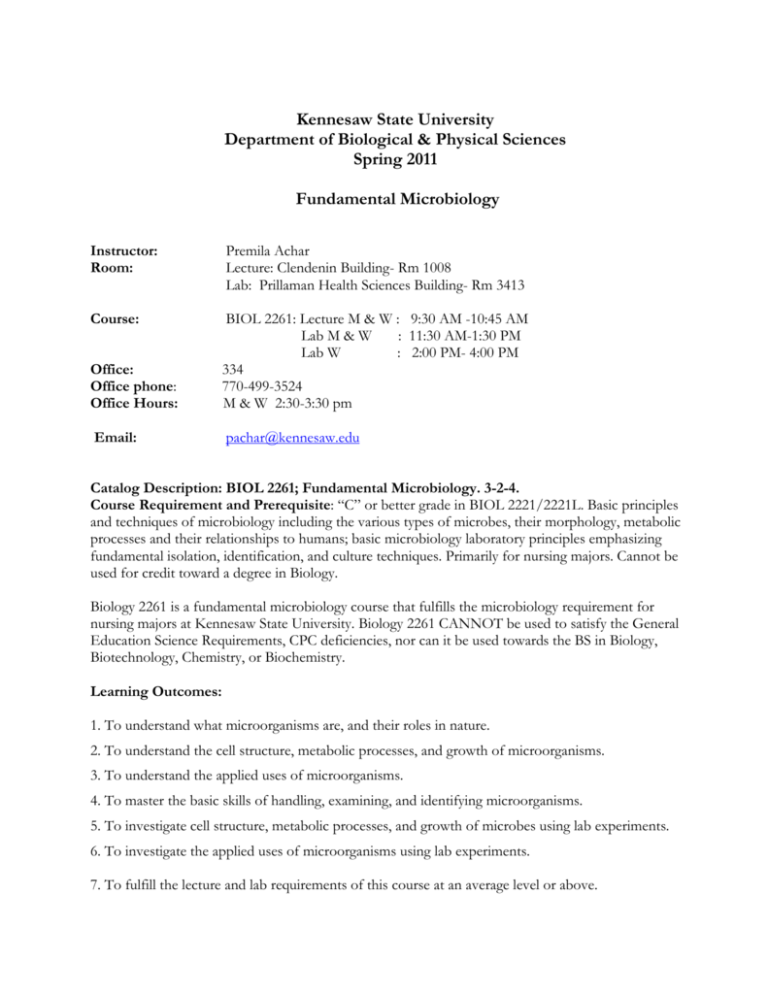
General Microbiology: 3340: 03/04 Fall 2008 Kennesaw State University Department of Biological & Physical Sciences Spring 2011 Fundamental Microbiology Instructor: Room: Premila Achar Lecture: Clendenin Building- Rm 1008 Lab: Prillaman Health Sciences Building- Rm 3413 Course: Office: Office phone: Office Hours: BIOL 2261: Lecture M & W : 9:30 AM -10:45 AM Lab M & W : 11:30 AM-1:30 PM Lab W : 2:00 PM- 4:00 PM 334 770-499-3524 M & W 2:30-3:30 pm Email: pachar@kennesaw.edu Catalog Description: BIOL 2261; Fundamental Microbiology. 3-2-4. Course Requirement and Prerequisite: “C” or better grade in BIOL 2221/2221L. Basic principles and techniques of microbiology including the various types of microbes, their morphology, metabolic processes and their relationships to humans; basic microbiology laboratory principles emphasizing fundamental isolation, identification, and culture techniques. Primarily for nursing majors. Cannot be used for credit toward a degree in Biology. Biology 2261 is a fundamental microbiology course that fulfills the microbiology requirement for nursing majors at Kennesaw State University. Biology 2261 CANNOT be used to satisfy the General Education Science Requirements, CPC deficiencies, nor can it be used towards the BS in Biology, Biotechnology, Chemistry, or Biochemistry. Learning Outcomes: 1. To understand what microorganisms are, and their roles in nature. 2. To understand the cell structure, metabolic processes, and growth of microorganisms. 3. To understand the applied uses of microorganisms. 4. To master the basic skills of handling, examining, and identifying microorganisms. 5. To investigate cell structure, metabolic processes, and growth of microbes using lab experiments. 6. To investigate the applied uses of microorganisms using lab experiments. 7. To fulfill the lecture and lab requirements of this course at an average level or above. Text: Microbiology: A Clinical Approach Authors: Anthony J. Strelkauskas, Jennifer E. Strelkauskas, Danielle MoszykStrelkauskas Laboratory Manual: Microbiology: Laboratory Theory and Application, 3rd Ed. Authors: Michael J. Leboffe, Burton E. Pierce. General Lecture Policies: Attendance is required for periods in which an invited speaker or student presentation is scheduled. Participation in class activities will results in bonus points to earn extra credit. Class activities are not scheduled. If you miss a lecture, YOU are responsible for obtaining all notes, announcements, and assignments. Lecture notes will be available via my Home page: http://science.kennesaw.edu/~pachar/ The lecture schedule provided is TENTATIVE and subject to changes. Students will be notified of schedule changes as soon as possible in class or will be posted on the instructor’s web site under “notices”. Cellular telephones, pagers and other similar devices must be turned off during class. No snacking is allowed in the class room once lecture begins. If you miss class, it is your responsibility to get any missed notes and handout from another student. Instructor’s Power point lectures/quiz/exam samples will be posted on instructor’s web page. General Laboratory Policies: Each student should have the lab manual at the beginning of each lab (you will be denied lab acess if you don’t have the lab manual on the first day of lab). Safety glasses, purchased by each student, are required to be worn during all exercises, failing which you will lose you 10 points out of your grand total*** (N.B you are not guaranteed the dept safety glasses since they “walk out” of lab mysteriously and if a student is seen walking out with dept belongings, university rules will be applied to you). Numbered microscope will be assigned at each student desk also numbered. Mishandling microscope (leaving slide on stage, stains, oil on lenses etc) will result from first warning to losing 5 points if ignored. You must prepare for laboratory each week by reading the scheduled exercises in the laboratory manual. On days when new exercises begin, the laboratory period will begin with a pre-lab quiz based on the laboratory manual. Please see the schedule below for the dates of lab exercises. Pre-Lab quizzes are worth 10 points each. Post lab Quizzes worth 10 points each based on completed lab exercises The mixed unknowns lab report is worth 50 points ( refer my home page for guidlines) Students will be notified of schedule changes as soon as possible in class. Before leaving the laboratory, each student must have the instructor or laboratory assistant to inspect the condition of his or her work area, microscope, and other equipment. Failure to clean the work area and equipment or to return equipment to its proper place will result in a 1 point reduction in the lab report grade per offense. Attendance Policy: You must attend the laboratory section in which you are registered. Attendance of leach lab session is essential for success in this class. Roll will be taken and this will factor into the final course grade. You must plan to attend laboratory for the full period each week. Students who arrive in lab late or leave lab before being dismissed may not receive credit for the lab. Each absence will result in a loss of 5 points** in the total grading policy (see grading policy below). Attendance is required for periods in which an invited speaker or student presentation is scheduled. If you miss 3 lab sessions, YOU will be considered FAIL. Lab Safety regulations: Failure to obey safety regulations will result in a 10 points*** penalty per offense Students are required to obey all safety regulations during laboratory, In particular: No food or drink is allowed in the lab as per department and university regulations. This includes unopened food packages and beverage containers. Students are required to wear safety glasses. Students are encouraged to purchase their own safety glasses. Shorts and short skirts are prohibited. Open-toed shoes, open-heeled shoes, heeled shoes, sandals, and bare feet are prohibited. Long hair, immaterial of gender, should be securely tied up to avoid contact with the Bunsen Burner. All waste must be disposed in properly labeled containers as directed by the instructor or lab assistant After each exercise, materials and glasswears to be moved to assigned places in lab ( tubes, plates, pipettes, microtips, slides, cover slips, scotton swab, gloves and related materials) Cellular telephones, pagers and other similar devices must be turned off during lab session. Assignment and Quizzes and Exams: Cellular telephones, pagers and other similar devices must be turned off and kept in bags at all times during quizzes and exams. Evaluation will take the form of Assignments, Quizzes and Exams* Several weeks identified on the schedule, the laboratory will begin with a laboratory pre quiz. The quiz will contain questions about the new lab exercise that you are starting. Lab quizzes graded (see course grading table). Post lab quizzes are based on completed labs. The lab worksheets pertaining to each lab is to be completed by each student since questions will be selected from this section for lab post quizzes. Worksheet will be checked in labs for completion. The laboratory report on lab exercise, PRACTICUM/ “mixed unknowns”, is also graded. See lab schedule below for due date for report and 5 points/day will be deducted until submitted. All quizzes, assignments and other course materials are related to lab work not collected by students will be shredded and recycled at the conclusion of the final exam period MAKING UP FOR MISSED LAB SESSIONS, QUIZZES AND ASSIGNMENTS Lab sessions will not be repeated for a particular group. Make-up quiz/exam/assignments will only be granted in extreme circumstances, and at the instructor’s discretion. Examples of acceptable excuses include: serious illness, funeral and others. The determination of the validity of other excuses and the necessary documentation to support them will be at the instructor’s discretion. Make-up examinations may consist of different question types, including essay questions, and they are usually more difficult than the scheduled examination. There is no make-up for Final exam There is no further make-up if student missed a scheduled make-up. If dates in the schedule below clashes with an event you have planned prior to posting of this syllabus onto my webpage, please inform me in class or via email before DROP/ADD week to afford you a make-up. The dates for examinations are listed below to be marked on your calendar and if it clashes with any of your academic activities, student should notify me in the first week of lecture. Inclement Weather: In adverse weather situations, find out the status of school closings by checking the following weblink:https://portal2.kennesaw.edu/pls/portal92/APP_SNOW.DYN_SHOW_STATUS.show COURSE GRADING PROCEDURE & POLICIES 1. The grade in this class is determined by the total number of points earned on examinations, laboratory quizzes, and the mixed unknown report ( Table 1). 2. Each exam will contain approximately 10 % laboratory material. 3. Examinations are closed book, multiple-choice exams. The material covered on each exam will be reviewed in class. Exam questions include content from lectures, textbook readings, and laboratory material. 4. The final examination is comprehensive and counts for 100 points for each student in the class. Final letter grades A, B, C…in the course will be assigned according to the point breakdown listed below: Graded assignments 2 Mid-term Exams @ 100 pts* Comprehensive Final Exam 1 class Activities @ 10 points each 7 Pre-Lab Quizzes @ 10pts each 4 Post-Lab Quizzes @10pts each Lab Unknown Report Grand Total Totals Final course grades Percentage (%) 200 pts. A 100 pts. B 90-100 80-89 10 pts 70 pts. C 40 pts. D. 50 pts. 470 pts F 70-79 60-69 <60 o *Exams will include questions from lectures & labs o **Failure to attend each lab will result in 5 points (see attendance policy for lab) & absence for 3 labs is considered Fail in the course. o ***Failure to obey safety regulations will result in a 10 points penalty per offense (see lab safety regulations). Tentative Lecture Outline (subject to change) Dates Jan 10 Book Chapters Topics Chapter 1 Introduction to class Characteristics of Disease-Causing Microorganisms Introduction Microbiology Jan 12 Jan 17 Jan 19 Jan 24 Jan 26 MLK holiday Chapter 9 Chapter 10 Chapter 12 Structure of Bacteria Bacterial Growth Structure of Viruses Jan 31 Feb 2 Chapter 13 Chapter 14 Viral Pathogenesis Parasitic and Fungal Infections Disease Mechanisms and Control and Treatment Feb 7 Chapter 5 & 6 Requirements for Infection & Transmission of Diseases Feb 9 Chapter 7 Principles of Disease Epidemiology Feb 14 Chapter 8 Emerging/Re-emerging Infectious Disease Feb 16 Exam 1 Feb 21 Feb 23 Feb 28 March 2 Chapter 18 Chapter 19 Chapter 20 Chapter 20 (contd.) Control of Microbial Growth Antibiotics Antibiotic Resistance Antibiotic Resistance Microbial Infections March 5-11 March 14 March 16 March 21 March 23 March 28 March 30 April 4 April 6 April 11 April 13 April 18 Spring break Class Activity Chapter 21 Chapter 21 (Contd.) Chapter 22 Chapter 22 Contd.) Chapter 23 Chapter 23 (Contd.) Exam 2 Chapter 24 No Class- Library day Chapter 25 and Chapter 26 Respiratory System Digestive System Genitourinary Systems Central Nervous Systems Deadly pathogens of Humans Blood and Skin and Eyes Chapter 25 and Chapter 26 (contd.) Chapter 28 Chapter 17 April 20 April 20 April 25 April 27 Bioterrorism Failures of the Immune response: AIDS Revision Chapter 18 - Chapter 28 Last day of classes Final Exam May 2 TBA May 3-9 Laboratory Schedule BIOL 2261 – Spring 2011 Week of Lab Dates Jan 10 Jan 17 Jan 24 Lab Units No labs Lab Manual Exercise Pre-Quiz - - No labs MLK holiday Unit 1: Lab Safety & Fundamental Skills Unit 2: Microbial Growth Complete 1-1, 1-3, 1-4; Begin 2-1, 2-2 2-1, 2-2 Feb 7 Unit 3: Control of Pathogens Complete labs 2-1, 2-2 Begin 2-12, 2-13, 2-14 2-12, 2-13, 2-14 Feb 14 Unit 4: Microscopy: Viewing MedicallyImportant Microbes Complete 2-12, 2-13, 2-14 Begin 3-1, 3-3, prepared slides from Section 12:1-4 Jan 31 Feb 28 March 7 March 14 March 21 Unit 5: Staining I Gram stain and endospore stain No labs Unit 5: Staining II: Capsule and Endospore PRACTICUM Begin 1-1, 1-3, 1-4 Begin 3-7, 3-10 Practice streak plate PostQuiz - 1-1, 1-3, 1-4 Unit 1 & 2 3-1, 3-3 3-7, 3-10 Spring Break Complete 3-7, 3-10 BEGIN PRACTICUM 3-14 (streak plate)) PRACTICUM 3-14 Gram stain and Endospore stain. Establish Pure Cultures of unknowns. Unit 3 & Unit 4 March 28 Unit 6: Selective Media with Clinical Specimen Collection & Analysis April 4 Complete Practicum April 11 Unit 7: Antibacterial Susceptibility Testing and Epidemiology April 18 April 25 May 2 Unit 8: Quantitative Indirect ELISA No labs Begin 4-3, 4-4, 4-5, 4-6, 5- 4-3, 4-4, 425, 5-30, 6-2, 7-1 5, 4-6, 5-25, Inoculate G+ cocci and G- 5-30, 6-2, 71 bacilli unknowns onto Selective Media Complete 4-3, 4-4, 4-5, 46, 5-25, 5-30, 6-2, 7-1 Begin 5-24, 7-3, 7-5, 7-6 Complete 5-24, 7-3, 7-5, 76 11-7; ClearView Strep Test (not in lab book) Unit 5 & Unit 6 5-24, 7-3, 7- Practicum 5, 7-6 Report due in Class Unit 7 & Unit 8 Last day of classes Academic Integrity Every KSU student is responsible for upholding the provisions of the Student Code of Conduct, as published in the Undergraduate and Graduate Catalogs. Section II of the Student Code of Conduct addresses the University's policy on academic honesty, including provisions regarding plagiarism and cheating, unauthorized access to University materials, misrepresentation/falsification of University records or academic work, malicious removal, retention, or destruction of library materials, malicious/intentional misuse of computer facilities and/or services, and misuse of student identification cards. Incidents of alleged academic misconduct will be handled through the established procedures of the University Judiciary Program, which includes either an "informal" resolution by a faculty member, resulting in a grade adjustment, or a formal hearing procedure, which may subject a student to the Code of Conduct's minimum one semester suspension requirement. Plagiarism and Cheating The above is in accordance to the University policy concerning plagiarism and cheating as stated in the KSU Student Code of Conduct. Refer to KSU document. All instances of academic misconduct, both intentional and unintentional, will be handled through established procedures of the University Judiciary Program (http://www.kennesaw.edu/judiciary/procedur.shtml). Students violating the University's academic honesty code are subject to University-level disciplinary action, which may include suspension or expulsion from the University. For exams, any student observed cheating will receive an automatic zero for the entire exam in addition to any penalties assessed through campus disciplinary procedures. Academic Withdrawal Policy Students may withdraw from one or more courses anytime before the last three weeks of the semester. However, as of Fall 2004, students will be allowed a maximum of eight total withdrawals if they enter KSU as a freshman. Transfer students will be allowed one withdrawal per fifteen credit hours attempted, for a maximum of eight. Students who choose to pursue a second degree at KSU will be allowed two additional withdrawals. Students who entered KSU before the Fall of 2004 will be allowed one withdrawal per fifteen credit hours attempted for a maximum of eight. To withdraw, the student should complete an official withdrawal form in the Office of the Registrar. Students who officially withdraw from courses on or before the last day to withdraw without academic penalty will receive a “W”. Students who officially withdraw after the last day to withdraw without academic penalty (and before the last three weeks of the semester) will receive a “WF”, which will be counted as an “F” in calculation of their grade point average. The only exceptions to these withdrawal regulations will be for instances involving unusual circumstances, which are fully documented. Students may appeal to the academic standing committee for consideration of unusual circumstances. Students cannot withdraw from their courses and remain in the program; they must carry at least 3 hours of credit. Program staff will not handle course withdrawals. Students must contact their home institutions (where they are registered) and handle the process themselves. They must provide the Faculty Member and Program Director with evidence that they have dropped the course. Academic accommodations Any student with a documented disability or medical condition needing academic accommodations of class-related activities or schedules must contact the instructor immediately. Written verification from the KSU disAbled Student Support Services is required. No requirements exist that accommodations be made prior to completion of this approved University documentation. All discussions will remain confidential." ****Good Luck ****
